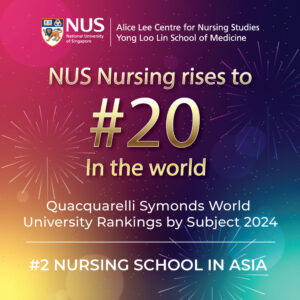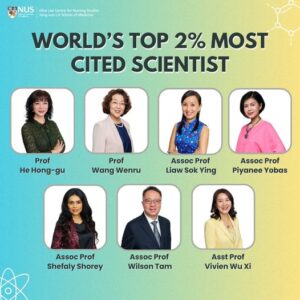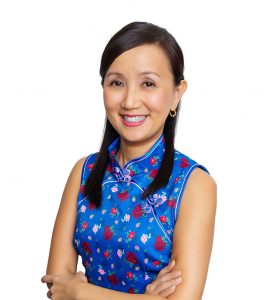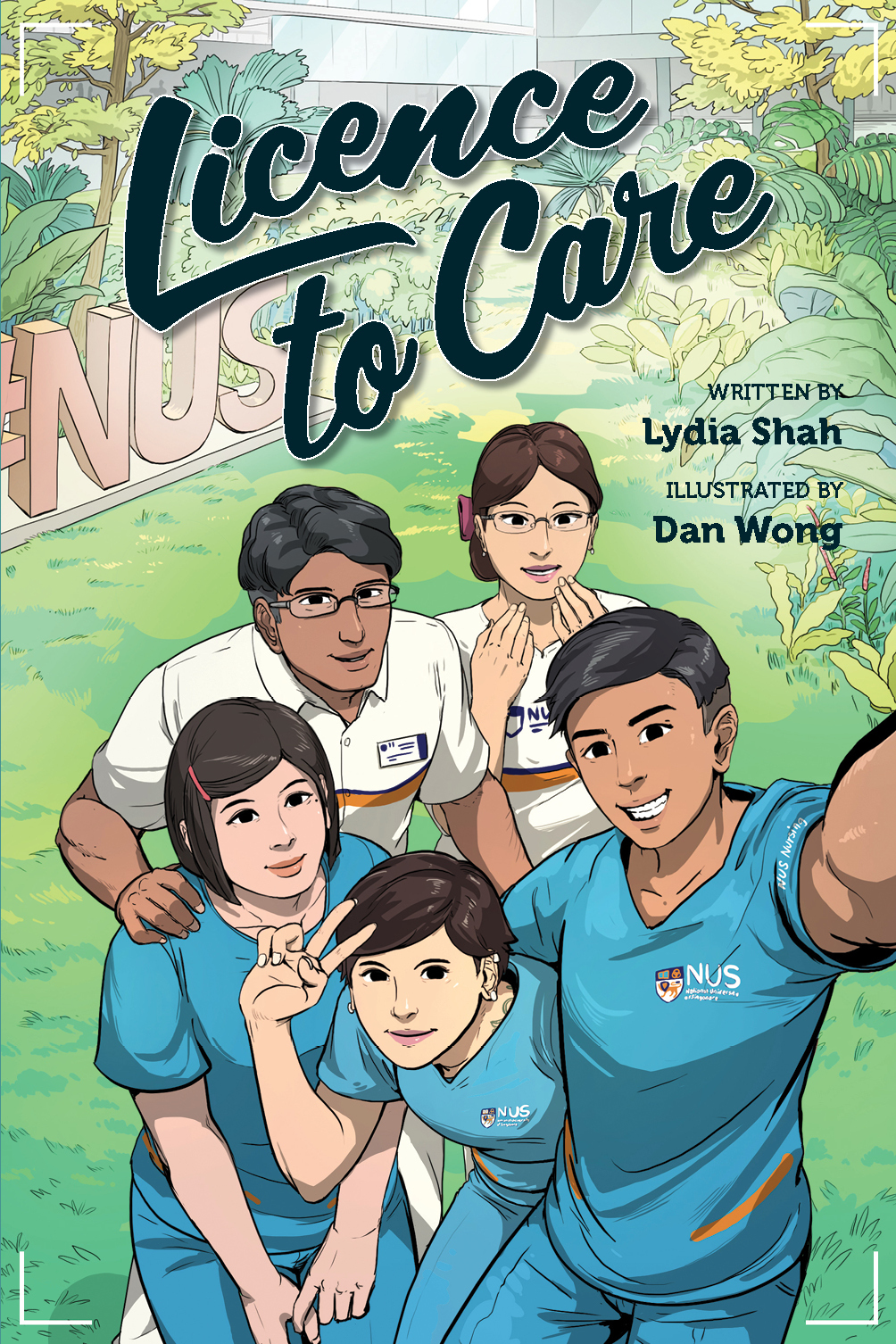Our History
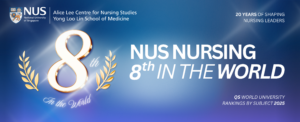
NUS Nursing achieves a historic milestone, debuting in the global top 10 for Nursing in the Quacquarelli Symonds (QS) World University Rankings 2025, ranking 8th in the world.
|
April |
NovemberThe Master of Nursing Programme celebrates its 20th anniversary. |
||
October
Asst Prof Shawn Goh is the fourth ALCNS academic inducted as a Fellow into the American Academy of Nursing in October. With over 3,000 Fellows, the American Academy of Nursing fellowship comprises Nursing’s most accomplished leaders in education, management, practice, and research. Earlier inductees from NUS Nursing include Prof Wang Wenru, Prof He Hong-Gu and Asst Prof Catherine Dong. |
||
July |
||
MarchProfs He Hong-Gu and Wang Wenru are inducted into the Sigma 2023 International Nurse Researcher Hall of Fame in July. Since 2010, the International Nurse Researcher Hall of Fame has recognised Nurse researchers who have made significant and sustained contributions to research. It is one of the highest international research awards for Nursing. As of 2023, Sigma has inducted 292 individuals worldwide. Four were from NUS Nursing—Professors He Hong-Gu Linda, Wang Wenru, Sally Chan Wai Chi and Violeta Lopez. |
AugustNUS Nursing launches the Graduate Certificate in Child & Family Health in the Community with the aim to upskill the competency of Registered Nurses, Allied Health, Social and Education professionals in alignment with the Ministry of Health (MOH) strategic direction to provide holistic and comprehensive support to women and their children to attain good health and well-being. |
||
|
|
AprilNUS Nursing launches Licence to Care, an illustrated graphic novel about undergraduate Nursing experience at the NUS Alice Lee Centre for Nursing Studies.The manga traces the journey of a group of students pursuing Nursing as a lifelong vocation, how they aid in the fight against Covid-19, and manage the anxiety of working on the frontlines while keeping their families safe. |
|
JulyNUS Nursing sets up the Centre for Healthcare Simulation where Nursing students are able to hone their craft in the newly renovated laboratory. The new laboratory provides more opportunities for practices in a clinical setting which is similar to the real environment. The mannequins and equipment in the laboratory allow students to think critically to resolve problems and perform physical assessment with its functionality. |
|
JanuaryNUS Nursing launches a new Graduate Certificate in Teaching & Learning for Healthcare Professionals. This programme is designed to provide healthcare professionals with a strong foundation on pedagogical preparation in curriculum development, teaching strategies and evaluation methods. It also aims to broaden the key learning constructs as well as deepen and advance a healthcare professional’s skills in teaching and learning. |
The NUS Nursing Post-doctoral Research Fellow programme is established to transit local PhD graduates to tenure track within three to five years, with the recruitment of one Research Fellow. | |
A part-time Bachelor of Science (Nursing Practice) programme is launched for local nursing diploma holders to upskill their academic qualifications. | |
NUS Nursing expands its training offerings for in-service nurses by starting a Graduate Diploma in Community Health Nursing. Singapore’s first part-time programme allowing working nurses to be credentialled for community healthcare, the course provides another pathway for working nurses to deepen their competencies. |
|
NUS Nursing launches a two-year Bachelor of Science (Nursing) programme under the Ministry of Health and Workforce Singapore’s Healthcare Professional Conversion Programme, taking in 34 mid-career professionals making a career switch to nursing. |
|
|
NUS Nursing announces its largest intake to date for its Bachelor of Science (Nursing) degree programmes. The 313 students comprise 279 school-leavers and 34 mid-career professionals. This is an increase of 33 per cent over the number of students admitted the year before, and represents a more than-sixfold increase since it took in its first batch of nursing students in 2006. The record intake caters to strong demand from school-leavers choosing to study Nursing at NUS. |
|
|
NUS Nursing is ranked 10th globally and first in Asia by the QS World University Rankings by Subject. |
|
|
NUS Nursing launches new courses in chronic disease management and clinical leadership to expand lifelong learning for in-service nurses to deepen their competencies and deliver care at their fullest potential. The new training framework has a strong emphasis on modularised and applied training, featuring short-term, customised courses based on the continuing education needs of in-service nurses to cater to their working arrangements and commitments. |
|
|
19 Advanced Practice Nurses graduate from the Collaborative Prescribing Programme co-hosted by NUS Nursing and NUS Pharmacy, becoming the first Collaborative Prescribing Practitioners in Singapore trained and certified to legally prescribe medicine. |
|
NUS Nursing implements the Entrustable Professional Activities (EPA) framework for clinical assessment, a shift from task-based to competency-based nursing education and assessment. EPA allows trainers to look at an individual student’s ability to holistically perform professional activities, which include cognition, psychomotor and character attributes. |
|
NUS Nursing is designated as an International Council of Nurses-accredited centre for research and development. |
|
Professor Emily Ang is appointed Head of NUS Nursing, the first Singaporean to take the helm at the Centre. |
|
NUS Nursing graduates Singapore’s first locally trained PhD nurse. |
|
NUS Nursing moves to its present location at the Clinical Research Centre, 10 Medical Drive, which is adjacent to the National University Hospital and the Centre for Translational Medicine housing the state-of-the-art Centre for Healthcare Simulation. |
|
NUS Nursing establishes the Master of Science (Nursing) and Doctor of Philosophy graduate research programmes to advance nursing science and evidence-based patient care. Prior to 2010, students who were keen on post-graduate nursing research enrolled in NUS Medicine’s PhD programme. |
|
|
Four academic units from the NUS, namely Alice Lee Centre for Nursing Studies, Yong Loo Lin School of Medicine, Department of Pharmacy and the Faculty of Dentistry formed a steering committee to incorporate interprofessional professional education (IPE), with the aim to transform the undergraduates into ‘collaborative practice-ready’ healthcare professionals. |
|
The Master of Nursing programme, which prepares Advanced Practice Nurses for Singapore’s healthcare sector, has been transferred from Division of Graduate Medical Studies (DGMS) to Alice Lee Centre for Nursing Studies (ALCNS). |
|
|
The school admits 28 students to the inaugural Bachelor of Science (Nursing) (Honours) programme. |
|
|
Singapore’s pioneer batch of pre-registered degree-level nursing students graduates. With the establishing of NUS Nursing, more students have the opportunity to obtain nursing degrees right up to the doctorate level. This has helped to professionalise nursing in Singapore. |
|
49 students are admitted into the inaugural BSc (Nursing) programme, comprising 46 A-level and three diploma students. |
|
The Alice Lee Centre for Nursing Studies (NUS Nursing) is established to offer Singapore’s first Bachelor of Science (Nursing) programme for school-leavers, making it the first local undergraduate nursing degree course in Singapore. |
|
|
The Lee Foundation presented a $30 million gift to the NUS to fund the establishment of the Alice Lee Centre for Nursing Studies (NUS Nursing), as well as new scholarships and professorships. |
|
The Master of Nursing programme is offered at the Division of Graduate Medical Studies at the NUS Yong Loo Lin School of Medicine (NUS Medicine). Nurses who graduate with a Master of Nursing degree are allowed to practise as Advanced Practice Nurses. |


